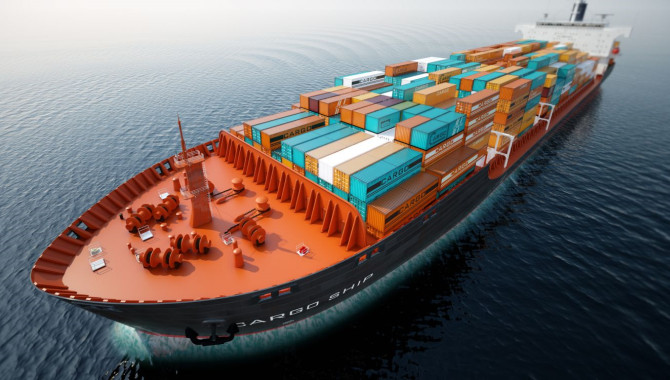
In the world trade, nearly half of the iron ore, more than a third of the coal, and a large number of non-metallic ore, agricultural products are shipped to China from all over the world. Experts said that China's steady demand is driving the growth of global shipping and world trade.
As an important barometer of macroeconomic, global shipping prices have risen sharply since August this year. On Sept. 4, the Baltic Dry Index (BDI), which tracks rates of bulkers in multiple segments, hit 2,518 points, its highest level since November 2010, almost nine years ago.
For the past 10 years, Ningbo-Zhoushan Port in east China's Zhejiang Province has been the world's largest in terms of throughput. But in the last month, there have been a number of piers under high-pressure operation. The port is going to be full very soon.
"The minimum storage capacity before was probably only 2.6 million tons, but now, for a variety of reasons, it has grown to about 3.12 million tons. The large storage capacity is not good for the safety of our yard, so we are trying to find ways to ship it out, including by trains," said Xin Zhaohui, head of storage yard of the Ningbo Zhoushan Port Company Limited Ore Company.
Statistics from the Ministry of Transport show that even affected by the typhoon, the iron ore throughput of the port exceeded 7.76 million tons in August, up 11.04 percent from the previous month.
Meanwhile, the increase of the throughput also drove up the global shipping price.
As China's shipping capabilities grows, some small and medium-sized shipowners, who used to have little involvement in global shipping, started to go abroad and bring goods home.
Zhejiang Daishan Zhongchang Marine Co., Ltd has nine ships that currently travel between southeast Asian countries and China.
The company's general manager assistant Li Renhai said compared with coastal transportation, international routes are more expensive and uncertain. The reason why they chose to go out is that the recent international shipping rates are very attractive.
"We have also adjusted the structure of shipping capacity from the original domestic trade to foreign trade," said Li.
Affected by international shipping rates, domestic shipping rates also rose recently.
"The overall shipping market, especially the dry bulk market, is perfectly competitive, so the overall international market is good, which is also good for the domestic market," said Chen Ming, head of the Ningbo Federation of Small and Medium-sized Shipping Companies.
In addition, experts said that the strong demand from China's economy is still driving global commodity trade, even as the season for purchasing agricultural products such as soybeans is coming to an end and the next step of grain transportation will drop.
Since the beginning of this year, with the construction projects started one after another, the demand for sand and gravel in the coastal areas of China is spreading outward, and mineral materials, including yellow sand, have become a new growth point of import.
"We are at a relatively stable state now. Despite the fact that global economic growth has slowed down, China has maintained a relatively steady development, especially in mining and construction materials. Not only domestic demand, but also international demand is very huge. If we consider the situation in recent years, we will find that more and more demand for commodities has turned to China," said Shi Jingxian, an industry analyst of the Ningbo Shipping Exchange.
Source:cctvplus
The opinions expressed herein are the author's and not necessarily those of The Xinde Marine News.
Please Contact Us at:
admin@xindemarine.com


 Ningbo Containerized Freight Index Weekly Commentar
Ningbo Containerized Freight Index Weekly Commentar  Ningbo Containerized Freight Index Weekly Commentar
Ningbo Containerized Freight Index Weekly Commentar  Ningbo Containerized Freight Index Weekly Commentar
Ningbo Containerized Freight Index Weekly Commentar  BIMCO Shipping Number of the Week: Bulker newbuildi
BIMCO Shipping Number of the Week: Bulker newbuildi  Ningbo Containerized Freight Index Weekly Commentar
Ningbo Containerized Freight Index Weekly Commentar  Ningbo Containerized Freight Index Weekly Commentar
Ningbo Containerized Freight Index Weekly Commentar